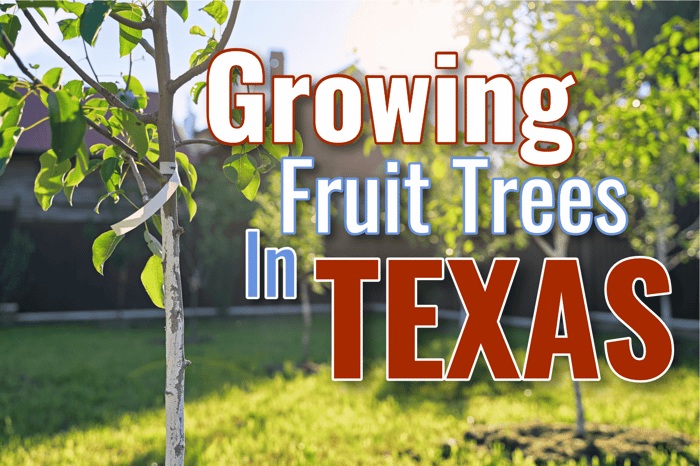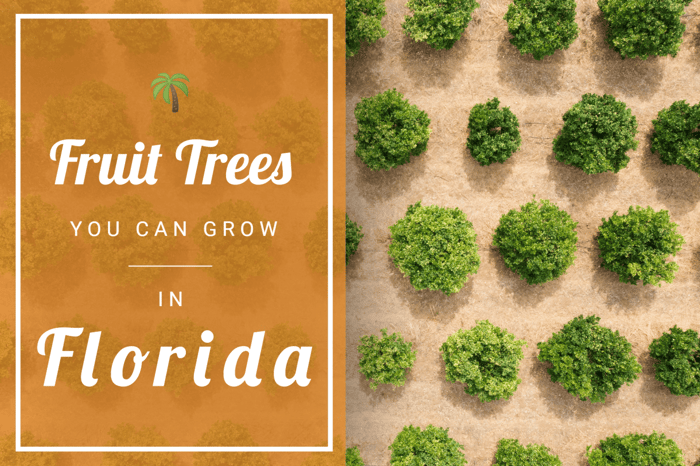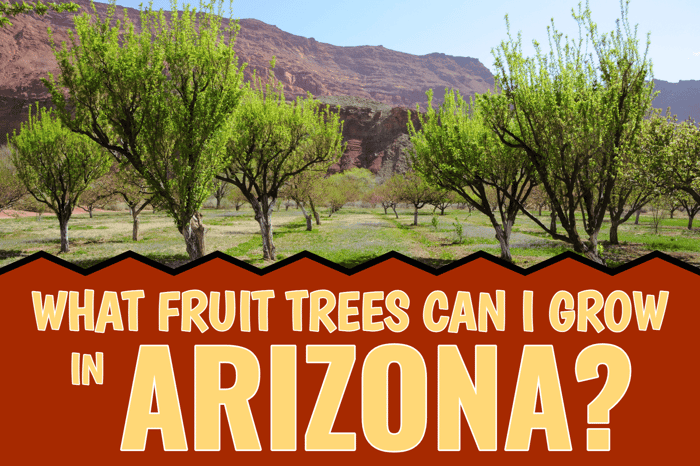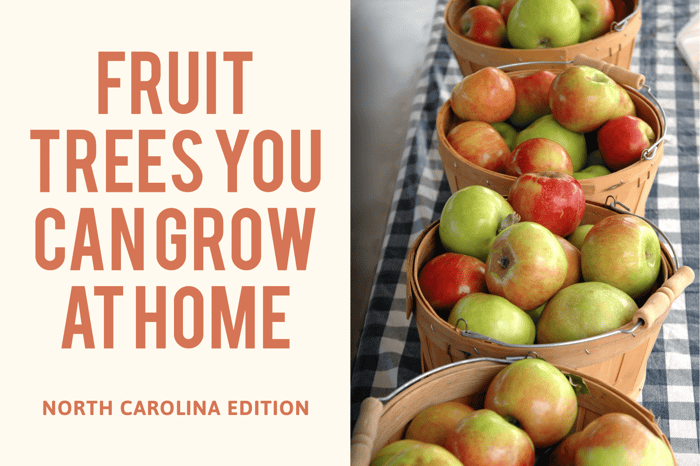Table of Contents
Texas: Fruit Tree Growing Guide
Texas is a state of extremes: big skies, bold weather patterns, and an impressively wide range of climates. It’s one of the few places in the country where nearly every type of fruit tree can find a home somewhere in the state. The juicy peaches in Central Texas and citrus-scented breezes in the Rio Grande Valley only skim the surface of the bounty that is a fruit grower’s dream. That is, as long as you know what to plant where!
Because the state is so vast, it’s helpful to break it down into four main geographic regions, each with its own set of USDA growing zones, soil types, and microclimates. These regions aren’t just lines on a map, they’re keys to understanding what your local conditions can support. Elevation, humidity, rainfall, and seasonal temperature swings can all play a role in determining which fruit trees will thrive in your garden.
In this guide, we’ll break down the four major regions of Texas and recommend the best fruit trees, vines, and bushes for each area. We’ll also touch on important growing considerations like chill hours, soil prep, and drought tolerance.
The 4 Geographic Regions:
1. East Texas (Zones 8a-9a)
East Texas is characterized by its rich pine forests, loamy soil, and humid subtropical climate. It gets the most rainfall of any region in the state and has warm summers and mild winters.
Growing Tip: Soil tends to be acidic and well-drained which is ideal for many fruiting plants. Mulch heavily to reduce fungal pressure and suppress weeds.
2. Central Texas (Zones 7b–9a)
Central Texas is a transition zone with limestone-heavy soils, hot summers, and a mix of humidity and dryness. Winters can be unpredictable, with occasional frosts.
Growing Tip: Watch your chill hours. Many fruit trees require 200–600 chill hours. Choose varieties adapted to Central Texas’s in-between climate.
3. South Texas & the Rio Grande Valley (Zones 9a–10a)
This is the warmest region in Texas and home to the state’s commercial citrus industry. Winters are mild and brief, and frost is rare in many areas. Irrigation is important due to dry spells.
Growing Tip: Protect young trees from strong coastal winds and use mulch to retain soil moisture. For citrus, fertilize with Romeo Fertilizer or G&B Organics Fruit and Citrus Tree Fertilizer to support healthy growth and high-quality fruit.
4. West Texas & the Panhandle (Zones 6b–8a)
This region includes high elevations, cooler nights, and a much drier climate. Water is scarce, and winters can be harsh with regular freezes. That said, it’s a great area for cold-hardy, drought-tolerant varieties.
Growing Tip: Soil improvement is essential. We recommend planting in raised beds filled with DIY Primo Potting Soil to help retain moisture and give roots a strong start. Drip irrigation systems are a must.
Fruit Trees
Apple/Pear Trees:
Apples & Pears are incredibly popular in Texas as they can be grown in all areas. The hearty Apple tree is perfect for the colder climates in the north but is also happy growing in the warmer earth further south. If you are growing in a hot climate, protect your tree with some kind of Plant Guard sun protection. Growers in East Texas will need to watch out for fire blight as this can be a limiting factor to your success. You'll want to prune out any evidence of disease as soon as it is spotted. In North, Central, South, and West Texas, cotton root rot is a major cause of tree loss. Avoid planting apple trees in spots where this disease has killed other plants.
Jujube Trees:
This delightful fruit is not grown enough! known as the Chinese Date, Chinese Apple, and even Chinese Olive. The Jujube is a sweet pit fruit that has the texture of an apple when ripe off the tree and has a date-like quality to them when dried. They are also incredibly adaptable to a variety of climates and soil types. The drought-tolerant tree makes an excellent choice for our growers in West Texas. There are almost no diseases or pests that plague the jujube. If you are looking for a fruit tree that is easy to grow, super hardy, and deliciously sweet fruit, look no further than the Jujube.
Loquat Trees:
Loquats produce an attractive evergreen tree that has adapted itself well to the Central, East-West, and South Texas. The North is excluded from this list because the temperatures often drop below 10°F in the winter which can kill these trees. Loquats set their fruit in the fall and they slowly mature into the spring so long as the winter temperatures stay above 25°F.
Peach, Plum & Nectarine (Stone Fruit) Trees:
Stone Fruit trees do very well in the hot state's climate but live relatively short lives due to insect & disease pressure. Selecting the right varieties will be crucial to your success, especially as early flowering varieties tend to be damaged by late frosts in the north. Pruning varieties to an open center and applying Plant Guard paint/spray to any exposed branches will help protect the trees from sunburn during the hot summer months.
Persimmon Trees:
he Persimmon is commonly grown all around the state and is native to south/southeast regions. Local varieties are not the large fruit fruiting ones that most people have come to prefer. Fuyu is a Japanese variety that has become quite popular because it is self-fruitful and it's cold tolerance. Persimmon trees easy to maintain requiring little pruning and having no severe pest/disease issues.
Pomegranate Trees:
These attractive trees or shrubs (depending on variety and pruning) are drought tolerant as well as naturally adapted to cool winters and hot summers. Wonderful is the most commonly grown variety mostly due to nurseries availability. That said, most varieties we offer will also flourish so long as the soil drains well, the weather is hot and a sprinkle of fertilizer in the spring will go a long way but is by no means required.
*Berries (Not trees but they grow very well):
One of the most recommended fruits to grow is Cane Berries (Raspberries and Blackberries). They are among one of the easiest of all the small fruit crops you can grow as they are not too picky on soil so long as it drains well. Avoid growing near wild Blackberries to minimize disease pressure.
Blueberries are another wonderful plant suitable for a variety of Texas climates. The Southern Highbush cultivars that we offer were bred to do well here. If you live in an area with clay soil that doesn't drain well, you are the perfect candidate for container growing. Make sure you use a potting soil rich in humus and mix in a generous amount of peat moss for a healthy crop. For our inground growers with well-draining soil, amend with compost and peat moss as well. For either growing method, you will want to keep your soil moist and top-dress with mulch and fertilizer. Check out our blueberry growing guide for more info.
Fig Trees:
Another well-adapted fruit tree is the hardy Fig. Even in northern Texas where figs may get freeze-damage and die back a bit, they typically fruit on current year growth which will come in after the frost damage. Be sure to prune off the freeze-damaged wood in the spring to reduce the entry points of potentially harmful pests and diseases.
Citrus Trees:
Lemons, Limes, Grapefruits & Mandarins are excellent choices for growers in the south and coastal Texas where the weather stays warmer. These areas provide the sunny hot weather needed to sweeten your favorite Mandarins and Oranges. Citrus trees are incredibly sensitive to cold temperatures and will need to be grown in pots and brought inside for the winter if you are growing in the colder northern climate that gets colder than 30°F in the winter. Cold-hardy lemons and limes are a great option if you do not get as much sun but you still want some fresh citrus year-round.
To reduce the spread of Citrus Greening Disease (HLB) certain states like Texas, California, Florida & Arizona are not allowed to import citrus trees from other states.
Avocado Trees:
Avocado trees are a favorite among many. This is another tropical tree that needs to be protected from the cold. If you are in the colder parts of Texas and are up for the challenge then an indoor Little Cado in a 40-gallon container is your best bet. Growers in southern the state have the most options as the warm weather is perfect for avocado cultivation. For a year-round harvest we recommend that you plant:
Late Summer/Fall: Stewart, Mexicola Grande, Holiday
Winter: Fuerte, Pinkerton, Holiday
Source: https://aggie-horticulture.tamu.edu/extension/fruitgarden/fruitvariety.html




